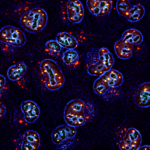Lien vers Pubmed [PMID] – 18467159
Mutat. Res. 2008 May;653(1-2):6-13
Hepatocellular carcinoma (HCC) is a heterogeneous disease triggered by various risk factors and frequently characterized by chromosome instability. This instability is considered to be caused primarily by Hepatitis B virus (HBV), although aflatoxin B1 (AFB1), a potent fungal mutagen is also suspected to influence chromosomal repair. We studied 90 HCCs from Italy, the country with the highest incidence of hepatocellular carcinoma in Europe, 81 samples from France and 52 specimens from Shanghai, in a region where intake of AFB1 via the diet is known to be high. All 223 tumours were characterized for 15 different genomic targets, including allelic loss at 13 chromosome arms and mutations of beta-catenin and p53 genes. Despite disparity in risk-factor distribution, Italian and French cases did not significantly differ for 14 of the 15 targets tested. beta-Catenin and p53 displayed moderate and similar mutation rates (18-29% of cases) in European series. By contrast, tumours from Shanghai were significantly different, with a lower mutation rate for beta-catenin (4% vs. 26%, p<0.0003) and a higher mutation rate for p53 (48% vs. 22%, p<0.0001) when compared with tumours of European origin. The Arg249Ser mutation, hallmark of exposure to AFB1, represented half of the changes in p53 in Shanghai. Furthermore, when stratified for the presence of HBV or p53 mutations, chromosome instability was always higher in Chinese than in European patients. This difference was particularly strong in p53-wildtype tumours (fractional allelic loss, 29.4% vs. 16.7%, p<0.0001). We suggest that AFB1-associated mutagenesis represents a plausible cause for the higher chromosome instability observed in Chinese HCCs, when compared with European primary liver carcinomas.

